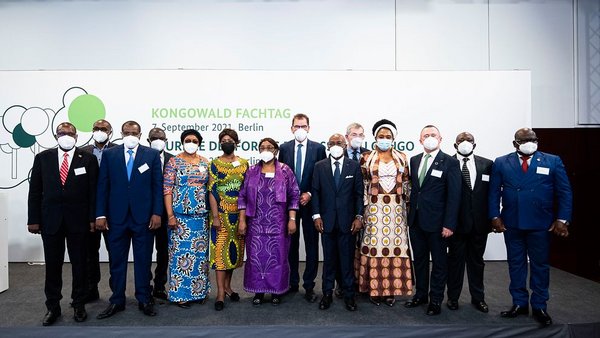 Read this article in French
Read this article in French- Share this article
- Subscribe to our newsletter
Calling for a ‘New Deal’ for forest protection
The German Federal Ministry for Economic Cooperation and Development (BMZ) currently holds the rotating presidency of the Congo Basin Forest Partnership of the Central African Forest Initiative (CAFI). Development Minister Gerd Müller therefore took the opportunity to invite representatives of the ten countries around the Congo Basin to a hybrid Tropical Forest Symposium, in the margins of which they signed a declaration on protecting the rainforest on the 7th September 2021.
Greater protection efforts by the ten countries together with sustainable forest management and forest protection measures are at the heart of the declaration. In return, countries like Germany commit to increased support for the tropical forest countries in Central Africa.
"Saving the climate and biodiversity cannot be accomplished without the world’s tropical forests. They account for about 20 per cent of terrestrial carbon sequestration,” Müller emphasised at the opening of the Symposium in Berlin.
He said that these forests were home to 75 per cent of all animal and plant species. “But the planet’s green lungs are in danger,” Müller warned. World-wide, an area of forest the size of a football pitch is being cleared every four seconds. The destruction of rainforests through slash-and-burn methods in places like the Amazon, Indonesia or the Congo Basin is responsible for eleven per cent of global CO2 emissions.”.
African rainforests hold the greatest amount of CO2 world-wide
“Experts estimate that by 2100, no more rainforest will be left in the Congo Basin,” Müller explained. “The consequences will be devastating for the whole of humanity, because the Congo Basin is the second-biggest tropical forest in the world after the Amazon rainforest and the biggest CO2 sink. The African rainforests hold more CO2 than all other forests."
"We must stop the slash-and-burn and forest destruction immediately," Müller continued. “We need a ‘New Deal’ for forest protection. Today, at the Berlin Tropical Forest Symposium, I received a commitment from all ten of the Congo Basin rainforest countries to step up their forest protection and strengthen their sustainable forest management.”
According to a BMZ press release, the Declaration signed was drawn up jointly with scientists and civil society representatives from the ten countries. Germany is supporting this process via the Central African Forest Initiative (CAFI). The goal is to protect and restore 127 million hectares of forest by 2030. The protection measures include transparent supply chains for timber from the region, economic alternatives for the local people and closely involving the indigenous population as ‘forest guardians’.
- The BMZ has already set up the Legacy Landscapes Fund, back in May 2021. The intention is to build up a capital stock of one billion dollars by 2030 in order to secure core funding for 30 of the most important nature reserves. The Fund will then form the world’s largest nature conservation foundation. Germany has provided 100 million dollars as start capital.
- The BMZ is supporting a total of 670 protected areas around the world with a combined land surface that is six times the size of Germany, and it has contributed to the protection of more than 130 million hectares of forest land.
- Worldwide, 420 million hectares of forest have been lost in the last 30 years, adding up to an area almost as large as the European Union. Right now, around ten million hectares of forest are disappearing from the Earth every year – mostly to make way for huge soya and palm oil plantations.
(BMZ/wi)
More information:
Congo Basin Forest Partnership
Central African Forest Initiative
Legacy Landscape Fund





Add a comment
Be the First to Comment